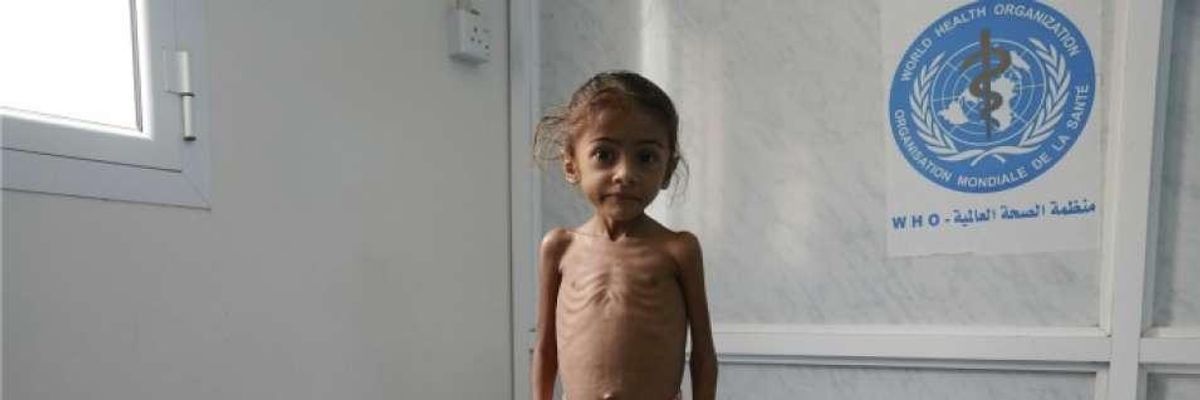The Trump Administration's decision to officially designate Yemen's Houthi Movement (Ansar Allah) as a Foreign Terrorist Organization (FTO) will fail to impact the group in any positive way while ultimately starving the Yemeni people. Such a designation is not only unwarranted and poorly considered in relation to humanitarian needs but speaks to the expansive cruelty of the Trump administration over the last four years regarding Yemen. The incoming Biden administration should not only work to immediately lift the designation once in office, but also reject the blind loyalty to Gulf monarchies and an anti-Iran basis for decision-making that has plagued the Trump administration to the detriment of so many innocent lives across the region.
A shift in approach cannot come soon enough for the Yemeni people. Yemen is experiencing the world's worst humanitarian conflict, with over 80 percent of its population in dire need of humanitarian assistance to survive. Over 14.3 million people are in acute need of aid today, with the Integrated Food Security Phase Classification (IPC) predicting that 47,000 people will face famine conditions by June 2021. The shortage of food runs parallel with a shortage of almost every other necessity for survival, including water and fuel, and stems from the economic collapse caused by the Saudi-Emirati sea and air blockade of Yemen that has been in place since March 2015.
The blockade has unleashed second and third effects on a country that imports 90 percent of its food. Chief among them are duel public health crises: one of the worst cholera outbreaks in human history - having spread to over 1.3 million people - and a COVID-19 pandemic that has spread in unmitigated fashion for almost a year. With a public health system decimated by years of war, the ability to properly address these and other diseases like diphtheria, measles, and dengue fever, let alone report an accurate number of cases, is nearly impossible.
True peace in Yemen can only be achieved by engaging with all the actors in the conflict, no matter the atrocities they have committed.
This public health crisis and the coinciding crisis surrounding basic resources constitute the humanitarian situation in Yemen today - a conflict that is completely manmade and caused by the poor decisions of non-democratic leaders in Yemen, the Middle East and North Africa (MENA), and the United States. Alongside the blockade and of equal importance to understand humanitarian shortcomings, regular and indiscriminate attacks on critical infrastructure are numerous. This includes 131 attacks on bridges by coalition forces and 81 separate attacks on medical facilities between 2015 and 2018, which have had a profound effect on public health and access to medical resources.
Almost every humanitarian metric shows a state of destitution and despair in Yemen, which makes the FTO designation by the United States even more confusing. This is not to suggest that the Houthis are innocent in the conflict. Rather, they are a leading contributor to the conditions on the ground today, committing unimaginable atrocities in violation of international humanitarian law.
Regardless of this, the designation of the Houthis is shortsighted as it complicates any humanitarian response by outlawing contact with them, making interactions with the people under their rule nearly impossible for U.S. citizens or organizations. Although the U.S. government always claims to provide waivers to humanitarian organizations, they make the legal language purposely vague. This causes humanitarian actors to become particularly risk averse, leading to a decrease in aid flows. This has already occurred in Yemen, where food imports have steadily decreased since rumors of a designation arose last November.
Further, the Houthis are known to not have foreign banks accounts and rarely travel abroad. With nearly 80 percent of the Yemeni population living under Houthi rule and most humanitarian NGOs rejecting the decision that is already clearly ill-prepared to impact the Houthis directly, it makes no sense to go through with a policy that will almost certainly only harm regular Yemeni citizens.
On top of this, and arguably worse for Yemen, are the implications on peace negotiations led by the United Nations and the international community. Such a designation is certain to have long-standing negative affects regarding Houthi decision making and their interest in peace and may illicit a negative response in negotiations with Saudi Arabia. On top of this, it hamstrings the Biden administration should it choose to engage with the parties to the conflict to achieve peace - a prospect Biden has signaled an interesting in implementing.
Unfortunately for the Biden administration, they cannot prevent the damage that will be caused from even a short period of time with the Houthis on the FTO list. With that being said, all efforts should be made by the incoming administration to remove the Houthis from the list, regardless of the optics. True peace in Yemen can only be achieved by engaging with all the actors in the conflict, no matter the atrocities they have committed. This is particularly true when considering the resilience of the Houthis and their support from Iran. If the Biden administration really wants to engage positively on the issue, it needs to take this seriously and put any issue of narrative within the United States to the side as it works to achieve the peace necessary to end the humanitarian crisis in Yemen.
Until that time, the people of Yemen will have to bear the consequences of a tone-deaf administration's exceedingly tone-deaf policies. Yet while the Trump administration makes its final moves to cement its infamous foreign policy legacy, those working to support the Yemeni people can and will carry on, just as they have for the last six years. It is long past-due for a U.S. administration to have their back.

